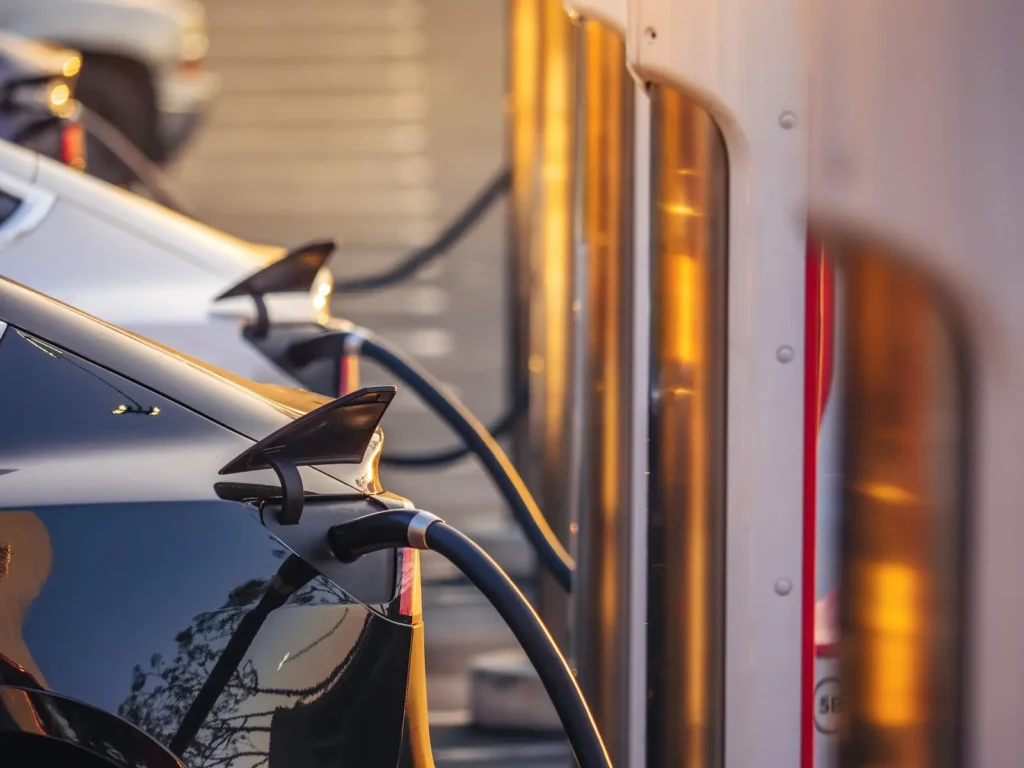What is the EV Power Station Industry?
The EV power station industry, also known as the EV charging infrastructure industry, is focused on the development, installation, and operation of electric vehicle charging stations. These stations are designed to power electric vehicles (EVs) using electric grids, renewable energy, or on-site energy generation (such as solar power). This sector has become an essential part of the broader electric vehicle ecosystem, which also includes the manufacturing of electric vehicles, battery technology, and renewable energy solutions.
The industry can be broken down into:
- Level 1 & 2 Charging Stations – Home chargers and public chargers.
- Level 3 Charging Stations (DC Fast Chargers) – High-speed chargers for public use, typically located along highways and in high-traffic areas.
What is Going On in the Industry?
The global push for sustainable transportation is driving significant growth in the EV power station industry. As of 2023, there is a clear trend toward the increased adoption of electric vehicles, fueled by both government policy and consumer demand for cleaner alternatives to fossil fuel-powered cars.
Key Industry Developments:
- Government Regulations and Incentives:
- In the U.S., the Infrastructure Investment and Jobs Act (2021) allocated $7.5 billion to expand the national network of EV chargers. This legislation is expected to support the installation of 500,000 new EV charging stations by 2030.
- The EU has committed to significantly reducing carbon emissions and plans to have 30 million EVs on the road by 2030, requiring a corresponding expansion of EV charging infrastructure.
- Many countries, including China, Germany, and Norway, are offering tax incentives and rebates to both consumers and businesses to encourage the adoption of EVs and charging infrastructure.
- Growth of the EV Market:
- Global EV sales hit 10 million vehicles in 2022, with China being the largest market (nearly 60% of global EV sales).
- According to BloombergNEF, electric vehicles will account for 40% of total global car sales by 2030 and 100% by 2040 in certain regions like Europe.
- The EV charging station market is expected to grow from $7.02 billion in 2022 to $39.25 billion by 2032, growing at a compound annual growth rate (CAGR) of 18.4% during this period.
- Partnerships and Mergers:
- Major automakers (Tesla, GM, Ford) are entering partnerships with EV charging providers. For example, Tesla Superchargers have expanded their network significantly, and Ford and GM have pledged to open up their charging networks to non-brand vehicles.
- Companies like ChargePoint, EVgo, Electrify America, and Blink Charging are some of the leading players in the U.S. charging station market, while BYD and NIO are key players in China.
- Technological Advancements:
- The push for faster charging is a key focus. The development of Ultra-Fast Charging (UFC) stations that can charge an EV in as little as 10-20 minutes is becoming more common.
- Wireless charging technology and solar-powered charging stations are also gaining attention, with companies like Plugless Power and SunPower working to innovate in these areas.
Key Players in the Industry:
- ChargePoint: One of the largest EV charging networks in the U.S., with over 160,000 charging locations across the country. ChargePoint has expanded its offerings to include residential charging stations and fast-charging solutions.
- Tesla Supercharger Network: Tesla’s Supercharger network is the most recognized global network of fast-charging stations, enabling fast charging for Tesla owners. Tesla has also opened up its network to other EV brands in certain regions, such as in Europe.
- EVgo: One of the leading providers of public fast-charging infrastructure in the U.S. EVgo operates over 800 fast-charging stations across the country, and it has plans to scale up its operations significantly.
- Electrify America: Established as part of Volkswagen’s settlement after the emissions scandal, Electrify America is rapidly expanding its fast-charging network. The company focuses on high-speed, ultra-fast chargers.
- Blink Charging: Blink offers both residential and public charging solutions and operates a growing network of EV chargers across the U.S. Blink is expanding its footprint in international markets as well.
- Shell Recharge: Shell, traditionally an oil and gas company, has also entered the EV charging infrastructure market through its Shell Recharge network. The company is building and managing EV chargers at gas stations and other locations globally.
Trends in the EV Power Station Industry:
- Growth in Fast Charging Networks:
- The development of fast-charging stations (DC fast chargers) is a growing trend. This addresses one of the main barriers to EV adoption — charging time. Fast chargers can significantly reduce charging times to 20-30 minutes, making EVs more convenient for long-distance travel.
- Integration with Renewable Energy:
- There is a strong push to power charging stations with renewable energy, especially solar power. This trend not only supports sustainability but also offers cost savings for operators in the long run. Several companies are exploring on-site solar panels and storage batteries to power EV stations.
- Smart Charging and IoT:
- The rise of smart charging solutions, which optimize charging times based on grid demand and individual EV usage patterns, is becoming more popular. Integration with mobile apps and IoT devices allows users to track real-time charger availability, charging speed, and costs.
- Charging Infrastructure for Fleets:
- Companies like Amazon, UPS, and FedEx are increasing their adoption of electric delivery vehicles, creating demand for dedicated fleet charging stations. This presents a large growth opportunity for charging station providers to meet the needs of electric delivery fleets.
- Public-Private Partnerships:
- Governments and private companies are teaming up to fund and build the EV charging network. Public-private partnerships (PPP) are becoming a standard model for developing infrastructure, particularly in urban areas and along highways.
Why is This a Good Industry to Enter?
- Expanding Market:
- The increasing adoption of electric vehicles worldwide means that the demand for charging infrastructure is also growing. As more consumers switch to EVs, the need for convenient and reliable charging stations will continue to rise.
- Government Support:
- Governments globally are offering incentives, subsidies, and funding to promote EV adoption and infrastructure development. This creates a favorable regulatory environment and ensures ongoing industry support.
- Sustainability and Long-Term Growth:
- The move toward renewable energy and carbon-neutral goals means that the EV charging infrastructure market is likely to see sustained growth for decades. The industry’s focus on reducing greenhouse gas emissions aligns with broader sustainability trends, attracting both consumers and investors.
- Technological Innovation:
- With technological advancements in charging speed, wireless charging, and integration with renewable energy sources, the EV power station industry is poised for constant innovation, which provides early movers with a competitive edge.
- Strong Investment Potential:
- Investors are increasingly looking for opportunities in clean tech, and the EV charging sector is seen as a high-growth, future-proof industry. The steady influx of capital into companies like ChargePoint, EVgo, and Tesla Superchargers indicates strong investor confidence.
Data, Statistics, and Facts:
- Global EV Charging Market Size: Expected to reach $39.25 billion by 2032, growing at a CAGR of 18.4% from 2023.
- Number of EVs on the Road: Over 10 million electric vehicles sold worldwide in 2022.
- Government Support: $7.5 billion allocated by the U.S. government for EV infrastructure development as part of the Infrastructure Investment and Jobs Act.
- EV Charging Stations Growth: In the U.S., there were 116,000 public charging stations as of 2022, with plans for significant expansion by 2030 according to the US Department of Energy.
Future of EV and Contractors
The EV power station industry presents a huge growth opportunity, fueled by global EV adoption, government policies, and technological advancements. The shift to sustainable transportation and energy systems offers a promising path forward for businesses in this sector. Whether you’re entering the market as a service provider, equipment manufacturer, or technology innovator, the trends indicate strong demand and long-term growth in the years to come.
Cascade QMS consultants are on standby to discuss how your business can take advantage of the EV industry growth. With Cascade QMS your company will be well prepared to work with major electric companies such as PG&E. Many companies such as Pacific Gas and Electric use complex contractor vetting systems such as ISNetworld. Is your safety plan in need of review? Give us a call for a complementary consultation!

